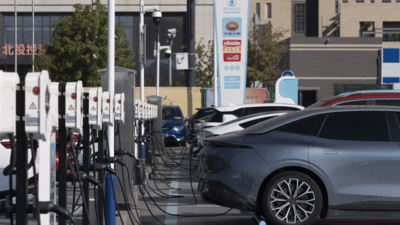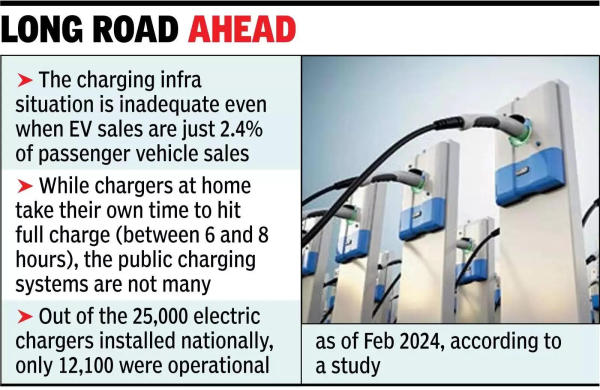
NEW DELHI: Electric cars are making a beeline for Indian roads, but are cities ready to bear the load?
A first-hand experience on the ground, and conversations with some of the early adopters, show that public charging infrastructure remains abysmally challenged, just as many new buyers also face the ire of RWAs and other residents - even in multi-crore condominiums in Gurugram and Mumbai - when they try to install home chargers that come bundled with the vehicles.
While companies may be launching the EVs with much fanfare and glitzy campaigns around 'connected vehicles' that can be controlled through apps on your phones, what they cannot guarantee is an on-ground preparedness when it comes to charging infra.
The situation on the ground is inadequate today even when EV sales are just 2.4% passenger vehicle sales.
Take this for an instance: A student recently had to get his vehicle towed as several charging stations that he went to in central Delhi were not working. There were charging points where people were found to be drying their clothes.
Similarly, an executive at an auto company has been using a genset to charge his EV, complaining that power supply is an issue.

Such experiences have also made people anxious when travelling long distances. For instance, while driving for a short break from Delhi to Jaipur, another auto company executive decided to lug along a portable diesel genset in the boot of his car to avoid getting stranded in case the battery runs out of charge.
Range anxiety , or the common concern around the charge left in the battery, is real, and comes to haunt many new buyers who bet on an EV.
While chargers at home take their own time to hit full charge (between 6-8 hours), especially with the batteries getting bigger for giving higher road-runs, the public charging systems are not many.
On top of that, many of the chargers in public places are of low power, with not many fast chargers present. And the charging guns and other infrastructure have been stolen at many locations across the country, including those located near Parliament in the national capital.
There are no concrete figures around the charging network present across the country, but according to a study by industry chamber Ficci and Yes Bank, out of the 25,000 electric chargers installed nationally, only 12,100 were operational as of Feb 2024.
The highest number of chargers are in Delhi, Maharashtra, Karnataka, and UP, as per the study, and one just expects that this number will go up substantially as more companies launch electrics and focus on developing a charging network (something being done by Maruti Suzuki, Hyundai, Mahindra and Tata).
There is also the issue of having a fixed car parking for many car owners. "Nearly 90% of people do not have a fixed parking spot. This means, it will be difficult for them to have a fixed place for home charging," an industry executive said.
 NEW DELHI: Electric cars are making a beeline for Indian roads, but are cities ready to bear the load?
NEW DELHI: Electric cars are making a beeline for Indian roads, but are cities ready to bear the load?
